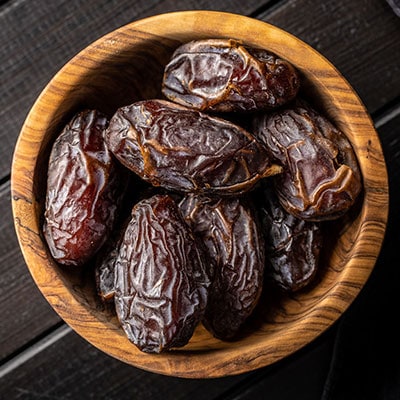Fun fact: Date palms can grow up to 75 feet high and are able to produce fruit for 40-50 years.
 Background
Background
- Dates are the edible fruit grown on a date tree otherwise known as the date palm.
- They are part of the Arecaceae botanical family. Other members of this botanical family include coconut, palm oil, sago, and heart of palm.
- There are hundreds of varieties of dates cultivated around the world.
- The most commonly grown date varieties in the U.S. are medjool and deglet noor.
Nutrition
- Dates contain beneficial amounts of selenium, copper, potassium, and magnesium.
- Selenium is an antioxidant involved in immune function, reproduction, and thyroid function.
- Copper promotes bone formation, collagen and connective tissue formation, and iron metabolism.
- Potassium helps to regulate blood pressure, fluid balance, heart function, muscle contraction, and nervous system function.
- Magnesium also supports blood pressure regulation along with bone formation and energy production.
How to Purchase, Prepare, and Store
- Dried dates are available in the baking aisle at grocery stores year-round.
- Fresh dates are typically available in the U.S. from September to March and can be found online or at specialty grocery stores such as Middle Eastern markets.
- Choose dates that are plump and glossy.
- Avoid those that are mushy or have crystalized sugar on their outer skin.
- Dates with white spots on the skin signifies aging — these are fine to consume, but aim to purchase dates without white spots as they will be fresher.
- The various varieties of dates differ in appearance including size, color, and shape.
- Prepare dates by removing the inner pit. Slice the date down the middle and remove pit if not already pitted.
- Store dates in an airtight container out of direct sunlight. Store in the refrigerator or freezer for up to one year.
- Consume dates as a tasty sweet treat. Use them in side dishes, salads, dessert recipes, or smoothies. Puree and use as a spread, add them to oatmeal or yogurt or stuff them with your favorite ingredients.
Nutrition Facts
1 date, pitted (24 g)
- Calories: 66.5
- Protein: 0.4 g
- Fat: 0.03 g
- Carbohydrate: 18 g
- Fiber: 1.61 g
- Calcium: 15.4 mg
- Iron: 0.2 mg
- Magnesium: 13 mg
- Phosphorus: 14.9 mg
- Folate: 3.6 μg
- Vitamin A: 1.6 μg
Via fdc.nal.usda.gov
Recipes
Request an Appointment
